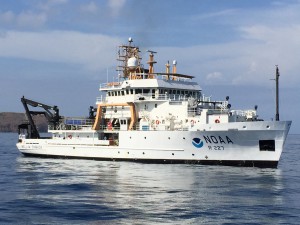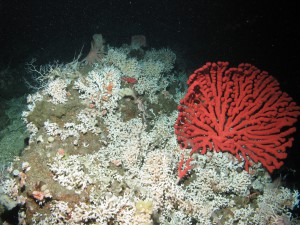
NCCOS, collaborating with NOAA’s Office of National Marine Sanctuaries,Office of Ocean Exploration Research, and Office of Coast Survey,embarked on the NOAA ship Bell M ShimadaonMarch 13 in the Channel Islands National Marine Sanctuary (CINMS), conducting ROV surveys to characterize unexplored habitat and assess abundance and condition of deep sea corals in the face of climate change and ocean acidification. The naturally high acidity and high dissolved inorganic carbon due to upwelling within the California Current ecosystem make it a natural laboratory to study the effects of ocean acidification on deep-sea organisms.

Scientists will collectsea water samples as well as samples of the deep sea coral species Lophelia pertusa at depths from 50 to 500 meters within the sanctuary. Coral samples collected will undergo laboratory testing under varied dissolved carbon dioxide conditions to predict how they may react under future ocean conditions.
Previous studies projectthat by 2050, all known aggregations of stony corals in the CINMS will be in corrosive conditions that favor coral dissolution, due to anthropogenic input of carbon dioxide. Progression of acidification will likely occur most rapidly at depths near 100 meters, where large aggregations of stony corals have recently been discovered. These reefs support extensive fish and invertebrate ecosystems, including commercially fished species, therefore studying the health and condition of these deep-sea corals and monitoring the water chemistry of these deep-sea reefs is critical for assessing the vulnerability of this ecosystem to ocean acidification.
TheShimadareturns to port March 22.Learn more about this project by viewing the project detail.
Learn more by viewing the Fact Sheet.For more information, contact Peter.Etnoyer@noaa.gov.
